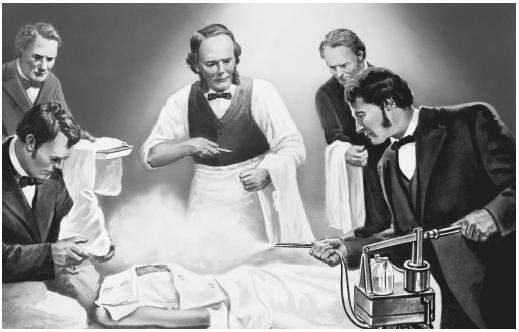Joseph Lister
BRITISH SURGEON
1827–1912
Joseph Lister is known as the founder of antiseptic surgery, a significant advance in medicine developed in the nineteenth century. Infection of wounds and surgical incisions was a major cause of hospital deaths before Lister developed a way of preventing these infections with chemical antiseptics. His discovery made surgery much safer and permitted surgeons to perform operations not previously attempted because of the high risk of fatal infections.
Lister attended University College in London, England, for both his undergraduate and medical education, graduating with honors in 1852. His first position following graduation was as a staff surgeon at University College Hospital. In 1854 he accepted an appointment in Edinburgh, Scotland, as an assistant to Dr. James Syme, a prominent surgeon and noted professor of surgery. In 1856 Lister married Dr. Syme's daughter, Agnes, and accepted a position as an assistant surgeon at the Royal Infirmary in Edinburgh. Lister developed a reputation as both a skillful surgeon and excellent teacher. In 1861 he was appointed professor of surgery at the University of Glasgow where he began the experiments that led to the practice of antiseptic surgery.
When Lister became a practicing surgeon in 1852, conditions in surgical wards were truly appalling. Most surgeons operated with unwashed hands and dirty instruments while wearing bloodstained operating coats that were never washed. The patients then rested in beds with dirty linens that were often not even changed between patients. Consequently many patients survived the operation only to die from gangrene or blood poisoning. Nearly all surgical patients experienced infections and the smell of putrefaction permeated surgical wards. The cause of infection was generally attributed to "bad air" and was considered an unavoidable aspect of all hospitals.
In 1864 Lister discussed the possible causes of putrefaction with a chemistry colleague who suggested that Lister read the publications of a French

chemist named Louis Pasteur. Pasteur had demonstrated that both fermentation of liquids and spoilage of butter were caused by "germs" carried in the air, and if these germs were prevented from entering a flask, fermentation and spoilage could be prevented. Lister saw a connection with hospital infections and concluded that it was not air itself that caused infection, but germs carried in the air. Lister reasoned that if hospital germs could be killed, infections could be prevented.
Pasteur had killed germs by boiling, a technique which could not be used on patients, but chemicals that killed germs could be applied to wounds, instruments, the surgeon's hands, and to bandages. Carbolic acid, now called phenol , was already known as a deodorizing agent and preservative, and Lister thought it might kill the germs that were causing infections. In 1865 Lister began using carbolic acid as an antiseptic during surgery and in bandaging afterward, publishing his results in 1867.
Initially his procedures were met with scorn and the idea that invisible germs were the cause of hospital infections was widely ridiculed. As his students and visitors witnessed antiseptic surgery's great success in reducing deaths from hospital infections, however, Lister's procedures became accepted. Within a few years Lister was honored in Germany and France, but not yet recognized in London. Following an appointment as professor of clinical surgery at King's College, Lister was able to directly demonstrate the success of his procedures to skeptical London surgeons. In recognition of his contribution to medicine, Lister was made a baronet in 1883 and named Baron Lister in 1897.

Although use of carbolic acid as a germ-killing antiseptic in surgery was later replaced by more effective techniques, Lister became world-renowned for demonstrating the importance of preventing microbial contamination of wounds and surgical incisions.
SEE ALSO Iodine ; Pasteur, Louis .
Robert K. Griffith
Bibliography
Farmer, Laurence (1962). Master Surgeon: A Biography of Joseph Lister. New York: Harper & Brothers.
Fisher, Richard B. (1977). Joseph Lister. New York: Stein and Day.
Comment about this article, ask questions, or add new information about this topic: